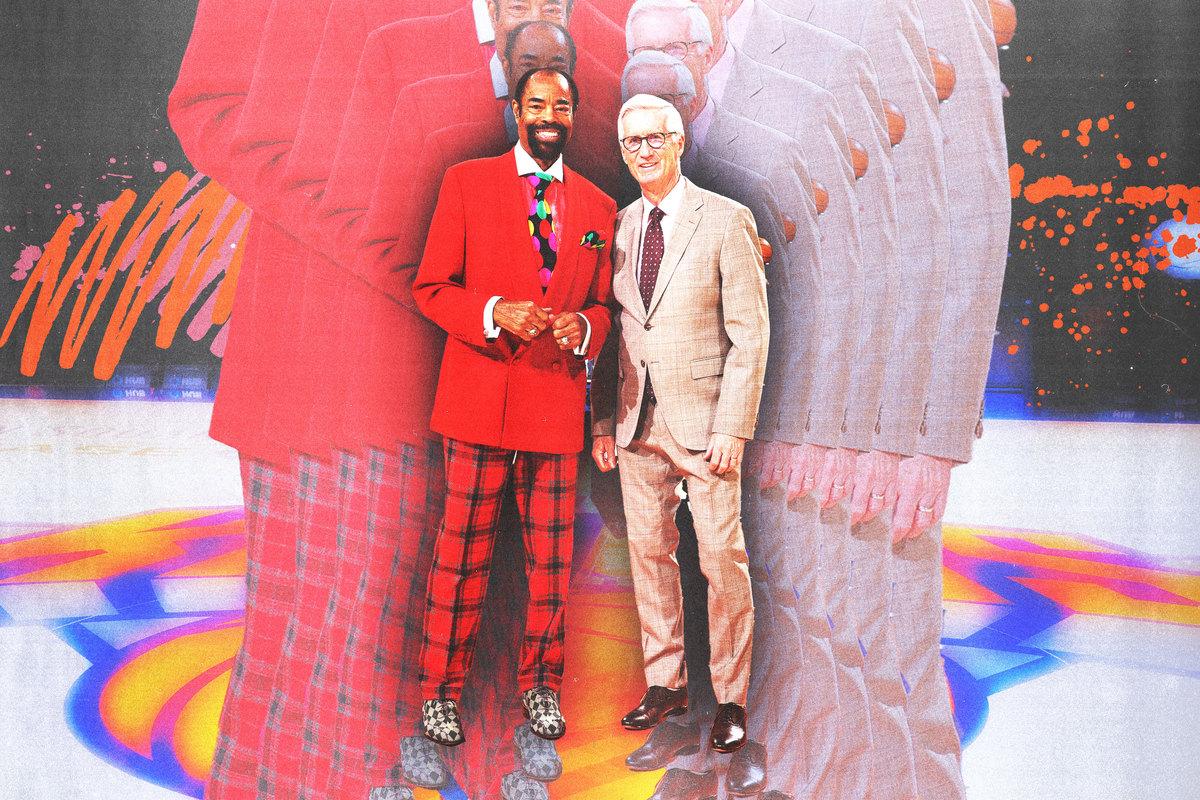
The 21st-century New York Knicks have not exactly been a model for consistency in the NBA. Since a miraculous run in the 1999 playoffs brought them within just three wins of their first championship since 1973, the Knicks have made it past the first round only three times. Despite being one of the NBA’s highest-spending teams, in one of its most attractive markets, New York has missed the playoffs 16 times since 2001. During that time, the organization has cycled through 11 head coaches and eight top executives. Aside from a handful of hopeful moments, the past quarter century of Knicks basketball has been characterized by dysfunction, turnover, and false prophets.
Through it all, through every “Fire [insert name here]!” chant at Madison Square Garden, there has been at least one stabilizing force to guide Knicks fans: the legendary broadcast duo of Mike Breen and Walt “Clyde” Frazier.
Last month marked 25 years since Breen and Frazier’s first TV broadcast together on MSG Network. On February 5, 1999, the Patrick Ewing–led Knicks played the Orlando Magic in the first game of that year’s lockout-shortened season. Looking back on that momentous night now, what Breen remembers most is the nerves.
“It was the biggest game of my life up until then,” Breen tells The Ringer. “And I’m doing it with a guy whose jersey is up in the rafters at the Garden.”
Back then, Breen was an up-and-coming broadcaster facing the daunting task of replacing Marv Albert. “I was nervous because, quite frankly, Marv had set the standard on the MSG Network for so long,” Breen recalls. Albert had been broadcasting Knicks games for so many years that, when Clyde’s Knicks squads won the title in 1970 and 1973, it was Albert’s voice on the radio making the call. All of a sudden, Breen found himself not only stepping in for a Hall of Famer whom he had viewed as a mentor, but also doing it alongside another Hall of Famer he had idolized as a young Knicks fan in Yonkers.
For Clyde, too, that night was his debut as the new color commentator for the Knicks. Frazier had retired from the NBA in 1980 after a remarkable career and started broadcasting games for his hometown Atlanta Hawks in 1981. In 1987, the same year that he was inducted into the Basketball Hall of Fame, Clyde joined the Knicks’ coverage on WFAN radio.
Although that night in 1999 represented their first TV broadcast as a pair, Breen and Frazier had already formed a unique connection dating back to their first radio broadcast together in 1992. And though neither of them could have known how the next 25 years would unfold, the duo’s emergent bond would be the engine of an enduring, celebrated partnership like few the NBA has ever seen.
“I’ve worked with so many different partners over the years, and sometimes chemistry happens instantly, but that’s rare,” Breen says. “Sometimes it takes awhile, you get chemistry. Sometimes you can work for a long time and you never really click 100 percent. But with Clyde it was immediate. And neither one of us can really explain it.”
Breen and Frazier have witnessed, called, or been a direct part of the Knicks’ greatest triumphs and worst heartbreaks since the Garden was Eden in the ’70s. They were the newly appointed voices of the team when Allan Houston and Latrell Sprewell propelled it to the 1999 Finals. They narrated everything from Jamal Crawford’s killer crossovers to the rise of S.T.A.T. and Melo to those two sensational weeks of Linsanity. They leaned on each other through difficult broadcasts, like the game after Clyde’s former teammate and Knicks legend Willis Reed passed away last year, or the one that followed the loss of Kobe Bryant in 2020. And, of course, the duo has been on the call for the Knicks’ steady ascension over the past few seasons.
Along the way, Breen and Frazier have become a cornerstone of the Knicks experience themselves—not just commentators but characters in the ever-evolving story of the team. For Breen, that success and longevity starts with their strong bond and rare chemistry.
“I had such respect for him, clearly for who he was as a player and his knowledge of the game, so I gave him a lot of room to do whatever he needed to do on the air,” Breen continues. “But the crazy thing is, right away, he gave me such respect and allowed me to do my thing. It was just a wonderful give-and-take. There was never a fight for airtime, there was zero ego involved. It just clicked from day one. And I’m so glad it did because it’s turned out to be certainly one of the highlights of my career, but also, being partners with him for all this time is one of the true blessings in my life.”
Any modern NBA fan recognizes Breen’s voice when they hear it. The 62-year-old is not just the voice of the Knicks, but also the voice of the NBA for an entire generation of fans—even if he’s too humble to embrace that lofty title. Breen called his 100th NBA Finals game this past postseason, which is more Finals telecasts than any other broadcaster in league history. His signature “Bang!” has become almost a rite of passage for any highlight to become immortal.
Just a year after Breen entered the Hall of Fame as a media member in 2021, Frazier was invited back to Springfield to become the first person to be inducted as both a player and broadcaster. Clyde’s dishing and swishing helped lead his team to the franchise’s only two championships, and he earned seven All-Star Game appearances, seven All-Defensive team honors, and six All-NBA berths over the course of his illustrious 13-year career. And while there have been many players turned broadcasters over the years, no one has transitioned quite so effectively into that latter career as Clyde. (I should note: I was unable to reach Frazier with an interview request through MSG Network.)
It’s a rare luxury for a local telecast to have one Hall of Fame voice—and the Knicks have been spoiled with two of them for more than 25 years. But there was once a time when the future of the fledgling broadcast duo wasn’t a sure thing. “In the beginning, both of them stood off from a fair amount of skepticism,” says Mike McCarthy, the former MSG Network executive who originally paired Breen and Frazier.
Before Breen started doing radio work for the Knicks, he did sports updates on Imus in the Morning, the WNBC (and later WFAN) morning show that was popular and funny, though far from politically correct. “There were several [team] executives that thought maybe it doesn’t make a whole lot of sense for Mike Breen to be doing the kind of humor he was doing on Imus and then be called the voice of the premier franchise in the NBA, because some of that content was pretty ribald,” McCarthy recalls.
And Breen wasn’t the only one that executives had reservations about initially. “Clyde, he had even more sort of stick-to-itiveness, for two reasons,” McCarthy says. “It was very brave of him to stick with what we’ll call ‘the style’—the rhyming and the vocabulary. It wasn’t going over unanimously in the boardroom. And he was also pretty honest-slash-critical of the team, which was refreshing. But I’ll say a lot of team executives feel like they have a thick skin and they can put up with it, and then quite a few of them end up not having that thick of a skin when you lose seven, eight in a row, and Clyde’s being critical.”
Frazier and Breen have never shied away from sharing their honest opinions and assessments of the Knicks, even during long losing streaks or intra-team disputes. That willingness to critique the team led to Albert’s firing by MSG Network in 2004, after he had been reinstated to his play-by-play post in 2000, but that didn’t stop Breen from following that standard once he rejoined Clyde in the booth. As residents of what many consider to be the “Mecca of Basketball,” Knicks faithful appreciate when their team is playing hard and performing well like few fan bases around the league—but they’re also merciless when the quality of basketball is anything beneath that level. And Breen would know.
“I’ve been a Knicks fan since I was a kid, so I know what Knicks fans feel,” Breen says. “I know what gets them upset, I know what gets them happy, because I’m one of them. I wouldn’t want anything but honesty from the Knick announcers when I was watching as a fan—and I think that’s what the fans want.
“Part of the job, and it’s not the part that you love, but part of the job is critiquing and criticizing,” Breen continues. “But I think if you do it in a respectful way, then you’ll be respected for that.”
As lifelong Knicks fan Jonathan Macri, the dean of the Knicks Film School, can attest, Breen’s and Frazier’s ability to toe that line has been one of the duo’s most admired qualities among the fan base. “New Yorkers know better than anyone when you’re trying to sell them something that is not legit,” says Macri. “That has been a really difficult tightrope to walk for much of the last 20 years, because no Knicks fan watching games for a lot of that time has been under any illusions that this team was not terrible, let alone good.”
Since the start of the 2001-02 season, no NBA team has lost more games than the Knicks. (Though the lowly Washington Wizards are poised to challenge that record.) Between that season and 2019-20, the Knicks finished over .500 just three times, including two pitiful 17-65 campaigns. And yet, for as bad as many of those teams were, Breen and Clyde still found a way to keep even the worst blowouts entertaining.
“The key is, you have to remember who you’re broadcasting to,” Breen says. “In the years where they were terrible, the people that were watching [were] the diehard Knick fans. And what they wanted to know is, ‘OK, the team’s not very good, but is the first-round pick who’s now starting to play more minutes, does he have potential?’ … Often on those nights, especially with Clyde, I can ask him about the old days. A lot of Knick fans—and I’m one—could hear those stories over and over again, and never get tired of them.”
Frazier is not just a terrific storyteller but also has a singular style as a broadcaster, just as he did in his playing days. From his provocative game-day suits to his rhyming catchphrases and extensive vocabulary, Clyde’s charm has endeared him to generations of fans who will likely never be able to fully grasp just how gifted a player he was. But Breen witnessed it, and he’s always appreciated the remarkable hoops wisdom beneath Clyde’s flashy surface.
“The rhymes were what a lot of people talked about,” Breen says, “but when you took away the rhymes, and he had actual basketball points that he was making, it was coming from a guy who’d seen it all and had conquered it all. That was the only thing that I worried about, that the rhymes [would] overshadow the excellent analysis that he gave on a nightly basis.”
Not that Breen doesn’t appreciate Clyde’s lyrical artistry: “I’ve even stolen a couple of his rhymes on national broadcasts because they provide some entertainment and a little flavor.”
In 2024, it’s hard to imagine Clyde’s broadcasting style any other way, and it’s a testament to him that he never shied away from it. “Whether it’s the wardrobe or the vocabulary, there’s a real courage to doing that, to wanting to stand out,” McCarthy says. “And he always had that. He went at it in a way that he thought would work, but more importantly, would be unique and not just cookie-cutter.”
“Clyde is a great story of personal growth,” says former U.S. senator Bill Bradley, who played alongside Frazier on those championship-winning Knicks teams in the ’70s. “He never stopped growing, and the result is he got better and better as a broadcaster, just like he got better and better as a player.”
As great as each of them are individually, Breen and Clyde are at their best working side by side, as each broadcast has become akin to listening in on a conversation between longtime friends. Like a point guard, Breen knows how to bring the best out of his teammate, just as Clyde did for the likes of Bradley, Reed, Earl Monroe, and Dave DeBusschere. Frazier may not delve into X’s-and-O’s minutiae, but he’s a natural teacher—especially when it comes to fundamentals, like the dangers of the crosscourt pass—who has the unique perspective of someone with over half a century of NBA experience. Breen sets the tempo with his play-by-play commentary, while Clyde adds the flair.
“Mike knows exactly when those periods of time are to just let Clyde cook,” says Macri. “He knows how to feed him, bit by bit, to get him to keep going down whatever path he’s on, and it’s funny how often the best stories emerge from those moments.”
On February 6, as the Knicks hosted the Grizzlies, MSG Network celebrated Breen and Frazier’s silver anniversary on the telecast and at the arena. The duo received signed custom jerseys from Jalen Brunson and Josh Hart; they watched prerecorded thank-you messages from celebrity Knicks fans such as Ben Stiller and Tracy Morgan; and they were joined on the air by Bradley, who congratulated them and reminisced with Clyde about the glory days. Unlike so many of their broadcasts over the years, the game was an easy win for the Knicks and a chance to celebrate the broadcast duo’s achievements. True to type, they also thanked the rest of their MSG Network team and everyone who had been an integral part of their success over the years, including McCarthy, director Howie Singer, and producer Spencer Julien.
This may be the best Knicks team since the early days of Breen and Clyde’s tenure together. Years of uncharacteristically shrewd front-office decision-making have yielded a deep and talented roster built around Brunson, who could become the first Knicks point guard to make an All-NBA team since Frazier himself. A slew of recent injuries has sapped some of the impeccable vibes at the Garden this season, but Breen recognizes the difference there is when the Knicks are competitive.
“When you get a player like Jalen Brunson to come in who has a chance to be really one of the great Knicks of all time, it gives you hope,” Breen says. “And as a fan, that’s what you want. And as a broadcaster, you so love having a team that has a chance to win every night they take the floor.”
For Knicks fans, it’s been extra special to hear Breen and Clyde work their two-man game for a team that’s back to fighting for every win. But no matter what caliber of team has taken the Garden floor, Breen and Clyde have always called it as they’ve seen it, finding the silver linings in even the worst Knicks teams—and becoming one for Knicks fans too.
After more than 25 years of working on TV together, Breen and Clyde’s relationship transcends the typical coworker dynamic. “Here’s a man who, when I was a kid, he was one of my childhood heroes,” Breen says of his broadcast mate. “To have this lifetime friendship with him, and 25 years of being partners on TV, it’s beyond my wildest dreams.”
The 78-year-old Frazier has said that he’ll be calling Knicks games for “as long as I can,” but he’s dialed back the number of road games that he works in recent years. Let’s hope there are many more broadcast anniversaries to come. But however long this lasts, Knicks fans should continue to cherish this duo, the likes of which they’ll never see again. As Breen looks back at their time together, it’s clear that he, for one, always will.
“It’s the old phrase of: What do you do when reality surpasses your dreams?” Breen says. “I even said to Clyde that night on the air, ‘I’d like to say these last 25 years have been a dream come true, but I couldn’t even dream of something that would happen like this.’”


